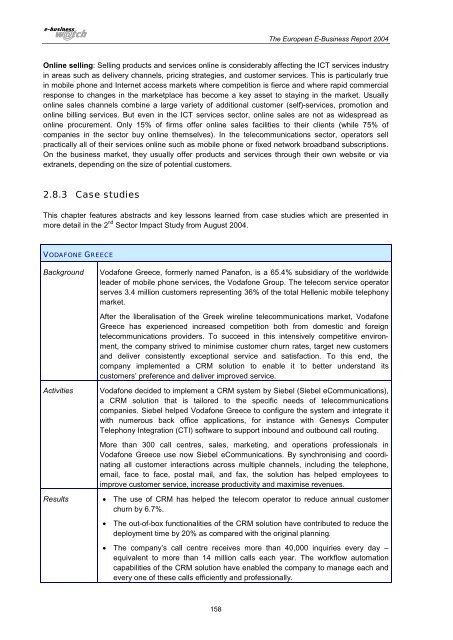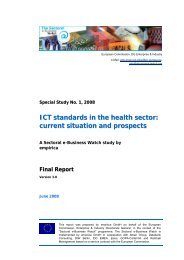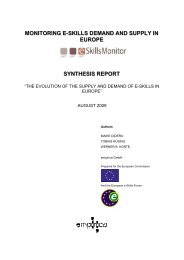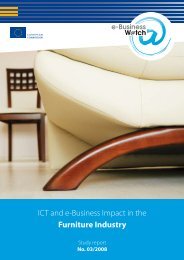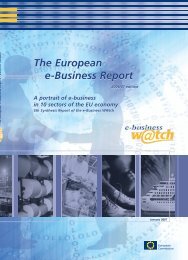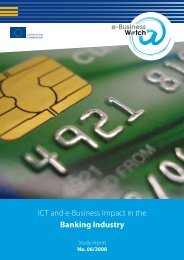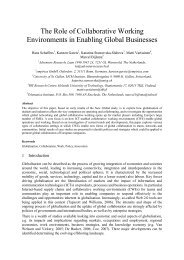The European e-Business Report 2004 - Berlecon Research GmbH
The European e-Business Report 2004 - Berlecon Research GmbH
The European e-Business Report 2004 - Berlecon Research GmbH
Create successful ePaper yourself
Turn your PDF publications into a flip-book with our unique Google optimized e-Paper software.
<strong>The</strong> <strong>European</strong> E-<strong>Business</strong> <strong>Report</strong> <strong>2004</strong>Online selling: Selling products and services online is considerably affecting the ICT services industryin areas such as delivery channels, pricing strategies, and customer services. This is particularly truein mobile phone and Internet access markets where competition is fierce and where rapid commercialresponse to changes in the marketplace has become a key asset to staying in the market. Usuallyonline sales channels combine a large variety of additional customer (self)-services, promotion andonline billing services. But even in the ICT services sector, online sales are not as widespread asonline procurement. Only 15% of firms offer online sales facilities to their clients (while 75% ofcompanies in the sector buy online themselves). In the telecommunications sector, operators sellpractically all of their services online such as mobile phone or fixed network broadband subscriptions.On the business market, they usually offer products and services through their own website or viaextranets, depending on the size of potential customers.2.8.3 Case studiesThis chapter features abstracts and key lessons learned from case studies which are presented inmore detail in the 2 nd Sector Impact Study from August <strong>2004</strong>.VODAFONE GREECEBackgroundActivitiesResultsVodafone Greece, formerly named Panafon, is a 65.4% subsidiary of the worldwideleader of mobile phone services, the Vodafone Group. <strong>The</strong> telecom service operatorserves 3.4 million customers representing 36% of the total Hellenic mobile telephonymarket.After the liberalisation of the Greek wireline telecommunications market, VodafoneGreece has experienced increased competition both from domestic and foreigntelecommunications providers. To succeed in this intensively competitive environment,the company strived to minimise customer churn rates, target new customersand deliver consistently exceptional service and satisfaction. To this end, thecompany implemented a CRM solution to enable it to better understand itscustomers’preference and deliver improved service.Vodafone decided to implement a CRM system by Siebel (Siebel eCommunications),a CRM solution that is tailored to the specific needs of telecommunicationscompanies. Siebel helped Vodafone Greece to configure the system and integrate itwith numerous back office applications, for instance with Genesys ComputerTelephony Integration (CTI) software to support inbound and outbound call routing.More than 300 call centres, sales, marketing, and operations professionals inVodafone Greece use now Siebel eCommunications. By synchronising and coordinatingall customer interactions across multiple channels, including the telephone,email, face to face, postal mail, and fax, the solution has helped employees toimprove customer service, increase productivity and maximise revenues.• <strong>The</strong> use of CRM has helped the telecom operator to reduce annual customerchurn by 6.7%.• <strong>The</strong> out-of-box functionalities of the CRM solution have contributed to reduce thedeployment time by 20% as compared with the original planning.• <strong>The</strong> company’s call centre receives more than 40,000 inquiries every day –equivalent to more than 14 million calls each year. <strong>The</strong> workflow automationcapabilities of the CRM solution have enabled the company to manage each andevery one of these calls efficiently and professionally.158


